Addictions
British Columbia Supreme Court rules province’s constitution protects hard drug use on playgrounds
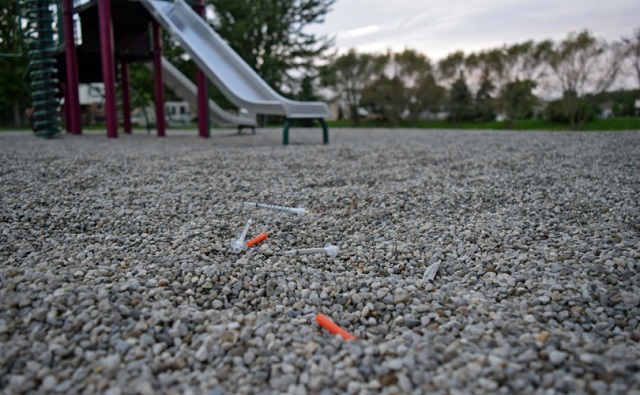
From LifeSiteNews
Hinkson even admitted that playgrounds would be exposed to having bio-hazardous drug paraphernalia but claimed that these issues take a back seat to the province’s drug overdose problems.
In light of the federal government relaxed stance on hard drug use in British Columbia, the province’s Supreme Court ruled that preventing drug users from going near playgrounds would violate their constitutional right and cause “irreparable harm.”
The NDP provincial government was considering amendments to a federal government hard drug use allowance pilot that allowed hard drugs to be consumed in small quantities by banning hard drug use near areas where kids gather, such as playgrounds.
NDP British Columbia Premier David Eby had said of his government’s amendment in May 2023 that “nobody wants this activity affecting our kids, and we will do something.”
Many municipalities had complained that parks and playgrounds should be off-limits to drug users and stay protected, per the Controlled Drugs and Substances Act.
The government’s amendment was encoded after a bill was passed last November that directed police to ensure illegal drugs in playgrounds were not allowed, and those doing so should be told to leave or face arrest if they did not comply.
The province’s playground amendment was put in place on September 18, 2023, which in effect barred hard drug use near playgrounds. It should be noted that the original decriminalization law included an exception banning drug use near “childcare facility premises.”
However, the province’s Supreme Court responded with an injunction that struck down this amendment in December 2023. The court’s injunction to the province’s law, which banned hard drug use near playgrounds, ruled that this amendment was a violation of the Charter of Rights and Freedoms.
According to provincial Supreme Court Chief Justice Christopher Hinkson, banning hard drug use in areas where kids congregate would cause “harm” to drug users.
Hinkson even admitted that playgrounds would be exposed to having bio-hazardous drug paraphernalia but claimed that these issues take a back seat to the province’s drug overdose problems.
“I … accept that the attendant public safety risks are particularly concerning given that many of the restricted areas and places in the Act are frequented by seniors, people with disabilities, and families with young children,” Hinkson wrote in his ruling.
Ruling ‘outrageous,’ says Conservative MP
Conservative MP Kerry-Lynne Findlay for South Surrey-White Rock, British Columbia, blasted the court’s ruling.
“Crime, chaos, drugs and disorder. An outrageous decision by the BC Supreme Court that only advances Trudeau’s radical agenda and puts our children at risk,” Findlay posted December 30 on X (formerly Twitter).
“Instead of normalizing open drug use, Conservatives will bring home safe communities & ensure our loved ones suffering from addiction are treated with compassion and on a path to recovery.”
The court injunction stemmed from the Harm Reduction Nurses Association arguing in court that restricting hard drug use near playgrounds would result in “lone drug use” that would lead to more overdoses.
“It is apparent that public consumption and consuming drugs in the company of others is oftentimes the safest, healthiest, and/or only available option for an individual,” Hinkson ruled.
Provincial government lawyers argued in court that the Harm Reduction Nurses Association was trying to use “anecdotal evidence, unsubstantiated conclusory statements” by claiming its amendment would cause harm.
Hinkson disagreed. “Given the evidence before me, I find that there is a high degree of probability that at least some of the harm set out by the plaintiff will in fact occur,” he said.
He also said the provincial amendment would violate one’s “right to life, liberty and security of the person” guaranteed by section 7 of the Charter of Rights and Freedoms.
“I am satisfied that the suspension of the Act … can be properly characterized as a substantial public benefit,” he ruled.
His injunction will stay in place until March 31, 2024.
Deaths from drug overdoses in Canada have gone through the roof, notably after the Trudeau government relaxed the nation’s hard drug rules in British Columbia on a trial basis.
Trudeau’s federal policy put in place in May 2022 in effect decriminalized hard drugs, including heroin, cocaine, fentanyl, meth and MDMA on a trial-run basis in British Columbia. While the policy was approved in 2022, it did not come into effect until February 2023.
Under the policy, the federal government began allowing people within the province to possess up to 2.5 grams of hard drugs without criminal penalty, but selling drugs remained a crime.
The policy has been widely criticized, especially after it was found that the province broke three different drug-related overdose records in the first month the new law was in effect.
Despite the policy, deaths from drug overdoses in Canada continue to skyrocket. The most recent statistics from 2021 show that they went up 33%.
Addictions
Poilievre attacks decriminalization of hard drugs with Safe Hospitals Act
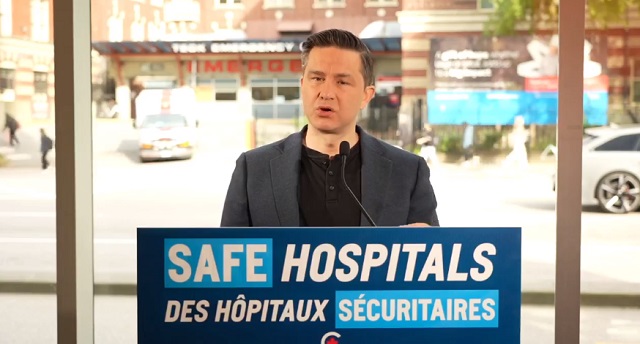
New release from the Conservative Party
The Hon. Pierre Poilievre, Leader of Canada’s Common Sense Conservatives, announced his plan today to ban dangerous weapons and drugs and punish those who harm doctors and nurses.
The Problem:
After nine years, Justin Trudeau’s radical experiment of decriminalizing hard drugs has failed. Since Trudeau formed government, over 42,000 Canadians have died from drug overdoses. Nanaimo, for example, has seen a nearly 400 percent increase in drug overdose deaths in the last four years alone, yet Trudeau decided to allow opioids, cocaine, heroin, and methamphetamine to be used in public places like hospitals and parks anyway.
The results of this experiment have been catastrophic. Chaos and disorder have reigned free in public spaces across British Columbia. Our once-safe hospitals are being destroyed by criminals and hard drugs, with the B.C. Nurses Union ringing the alarm bell, saying that patients and staff have been exposed to harmful, illegal drugs. The BC Nurses Union also reported that meth was being smoked in a unit just hours after the birth of a newborn baby. In northern British Columbia, the public health agency put out a memo telling hospital staff to allow patients to bring knives and other weapons into hospitals.
Life became so miserable that BC’s radical NDP Premier asked Justin Trudeau to walk back parts of his wacko decriminalization policy. But the Liberals haven’t learnt from their mistakes.
The Cause:
Two years ago, the Liberal Government granted the BC NDP Government’s request to allow hard drugs across the province, including in public spaces. In the first year of this reckless experiment, 2,500 Canadians died from drug overdoses. Meanwhile, community spaces like soccer fields, hospitals and city squares have been devastated by crime and disorder.
But Justin Trudeau refuses to rule out the requests from Toronto Public Health and the City of Montreal to allow hard drugs in Canada’s two largest cities. He also won’t say whether hard drugs should be allowed in children’s parks, hospitals and public transit. On top of this, the Liberal Minister of Mental Health refuses to acknowledge that their dangerous experiment was a failure.
The Solution:
Common Sense Conservatives will not allow this devastating experiment to play out in other Canadian communities. Canadians deserve a government that will keep hard drugs out of hospitals and will protect staff and patients. We will:
- Create an aggravating factor for the purposes of sentencing if a criminal has a weapon in a hospital.
- End the Health Minister’s power to grant exemptions under s.56 of the Controlled Drug and Substances Act if the exemption would allow people to use dangerous illicit drugs like fentanyl and meth in hospitals. This means that even if Trudeau grants Toronto and Montreal’s request to decriminalize hard drugs, our hospitals will be protected.
- Immediately pass Common Sense Conservative MP Todd Doherty’s Bill C-321, which will create an aggravating factor for assault committed against healthcare workers or first responders.
To be clear, the ban would not apply to any drugs prescribed by medical practitioners like doctors and nurses.
The Safe Hospitals Act will stop some of the insanity that Justin Trudeau and the NDP have unleashed on Canadians with their plan to decriminalize the public use of hard drugs everywhere in Canada. A Poilievre government will ban hard drugs, stop giving out taxpayer-funded opioids, and reinvest that money in treatment and recovery so we can bring home our loved ones drug-free.
Poilievre said:
“Justin Trudeau’s decriminalization experiment has failed. It has resulted in death, misery and destruction across British Columbia, while our hard-working nurses live in fear of inhaling dangerous drugs or being attacked by criminals.
“Instead of learning from this catastrophic mistake, Trudeau has doubled down. He’s refusing to reject Toronto and Montreal’s request to allow hard drugs like fentanyl and heroin to be used in Canada’s two biggest cities.
“Common Sense Conservatives will keep doctors, nurses and patients safe, even if Justin Trudeau won’t. The Liberals and NDP must vote for this common sense Bill until we can form a government that ends this deadly hard drug decriminalization experiment for good.”
Addictions
Liberals shut down motion to disclose pharma payments for Trudeau’s ‘safe supply’ drug program
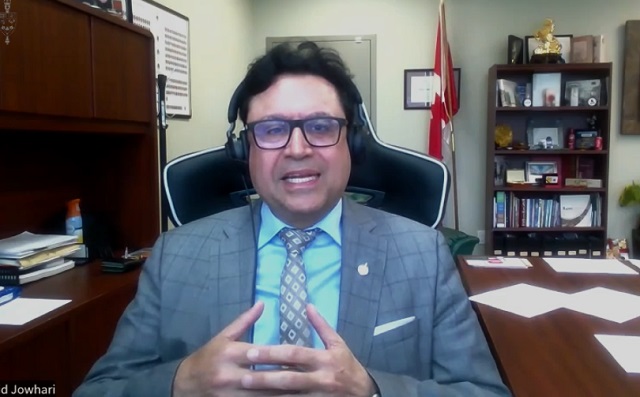
Liberal MP Majid Jowhari
From LifeSiteNews
The motion comes as RCMP testified in April that Trudeau’s taxpayer funded ‘safer supply’ drugs are being diverted to the black market.
Liberal Members of Parliament (MPs) resisted a motion to disclose payments made to pharmaceutical companies for “safe supply” opioids.
During a May 15 session in the House of Commons, Liberal MPs blocked a vote on a motion by Conservative MP Garnett Genuis to publish the contacts between Prime Minister Justin Trudeau’s government and pharmaceutical companies for “safe supply” opioids.
“Allow the public to see the contracts,” Genuis told the Commons government operations committee, questioning, “What do you have to be afraid of?”
“There are contracts involving this government and big pharmaceutical companies involved in producing and selling dangerous hard drugs which then end up on our streets,” he argued.
“Big pharmaceutical companies are involved in supplying hard drugs that are used as part of the government’s so-called ‘safe supply’ program,” Genuis continued. “These programs are a failure. We oppose them. In any event, we believe the public has a right to see the contracts.”
However, a committee vote on his motion was quickly blocked by Liberal MPs.
“I don’t think this is a motion we should move forward with,” Liberal MP Majid Jowhari said.
“I think we should go back and look at it and say our objective is to get an understanding of the source of safe supply and how it is being procured, which is different than going and saying, ‘Give us all the contracts,’” he continued.
Similarly, Liberal MP Irek Kusmierczyk claimed the request was a political tactic, saying, “They are against safe supply and safe consumption sites. That is clearly spelled out by my Conservative colleagues.”
Genuis’ request comes as the Royal Canadian Mounted Police (RCMP) testified in April that Trudeau’s taxpayer funded “safer supply” drugs are being diverted to the black market.
“Organized crime groups are trafficking not only illicit substances but any prescription drugs they can get their hands on,” Deputy Commissioner Dwayne McDonald, commander of the RCMP in British Columbia, testified.
Genuis put forward a motion asking that the committee “order the production of all contracts, agreements or memoranda of understanding to which the Government of Canada is a party signed since January 1, 2016” concerning the purchase of opioids.
Liberals’ refusal to release the contracts comes as the Trudeau government recently rejected a proposal from the Alberta government to add a “unique chemical identifier” to drugs offered to users under “safe-supply” programs so that authorities could track its street sales.
Indeed, the Trudeau government seems determined to pretend their “safe-supply” programs are a success despite the rising deaths and crime in cities that have adopted their policy.
However, the program proved such a disaster in British Columbia that the province recently requested Trudeau recriminalize drugs in public spaces. Nearly two weeks later, the Trudeau government announced it would “immediately” end the province’s drug program.
Beginning in early 2023, Trudeau’s federal policy, in effect, decriminalized hard drugs on a trial-run basis in British Columbia.
Under the policy, the federal government began allowing people within the province to possess up to 2.5 grams of hard drugs without criminal penalty, but selling drugs remained a crime.
Since being implemented, the province’s drug policy has been widely criticized, especially after it was found that the province broke three different drug-related overdose records in the first month the new law was in effect.
The effects of decriminalizing hard drugs in various parts of Canada has been exposed in Aaron Gunn’s recent documentary, Canada is Dying, and in U.K. Telegraph journalist Steven Edginton’s mini-documentary, Canada’s Woke Nightmare: A Warning to the West.
Gunn says he documents the “general societal chaos and explosion of drug use in every major Canadian city.”
“Overdose deaths are up 1,000 percent in the last 10 years,” he said in his film, adding that “(e)very day in Vancouver four people are randomly attacked.”
-
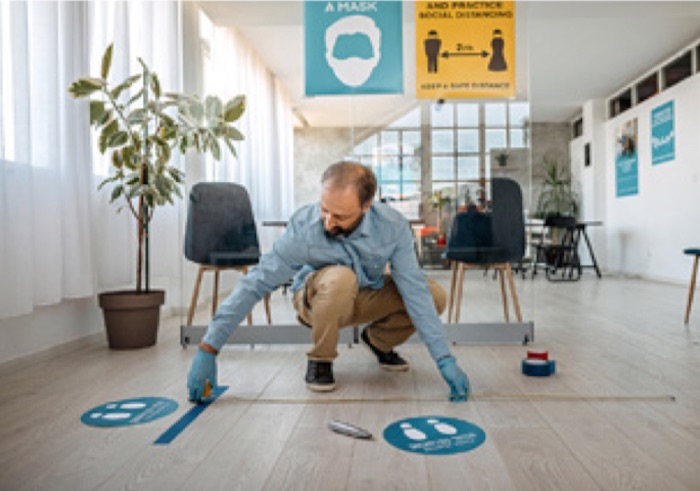
 Brownstone Institute2 days ago
Brownstone Institute2 days agoThe WHO’s Proposed Pandemic Agreements Worsen Public Health
-

 armed forces2 days ago
armed forces2 days agoTrudeau government has spent $10 million promoting DEI in the military as recruitment flounders
-

 COVID-192 days ago
COVID-192 days agoThe New York Times Admits Injuries from COVID-19 Shots
-
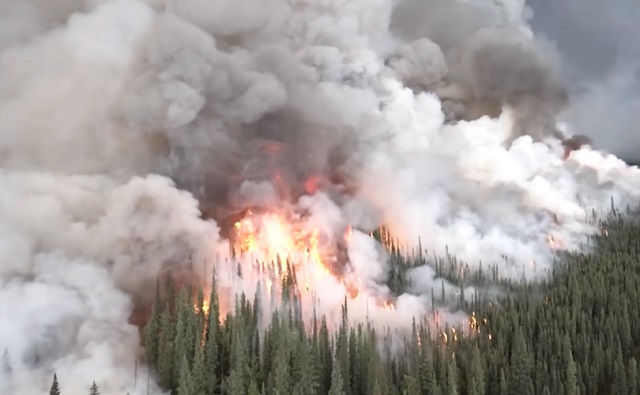
 National2 days ago
National2 days agoTrudeau again blames ‘climate change’ for mostly man-made wildfires
-

 Automotive2 days ago
Automotive2 days agoRed States Sue California and the Biden Administration to Halt Electric Truck Mandates
-

 Alberta2 days ago
Alberta2 days agoPharmacist-led clinics improve access to health care: Lessons from Alberta
-

 Alberta1 day ago
Alberta1 day agoFortis et Liber: Alberta’s Future in the Canadian Federation
-

 COVID-192 days ago
COVID-192 days agoElon Musk-backed doctor critical of COVID response vows appeal after court sides with medical board





